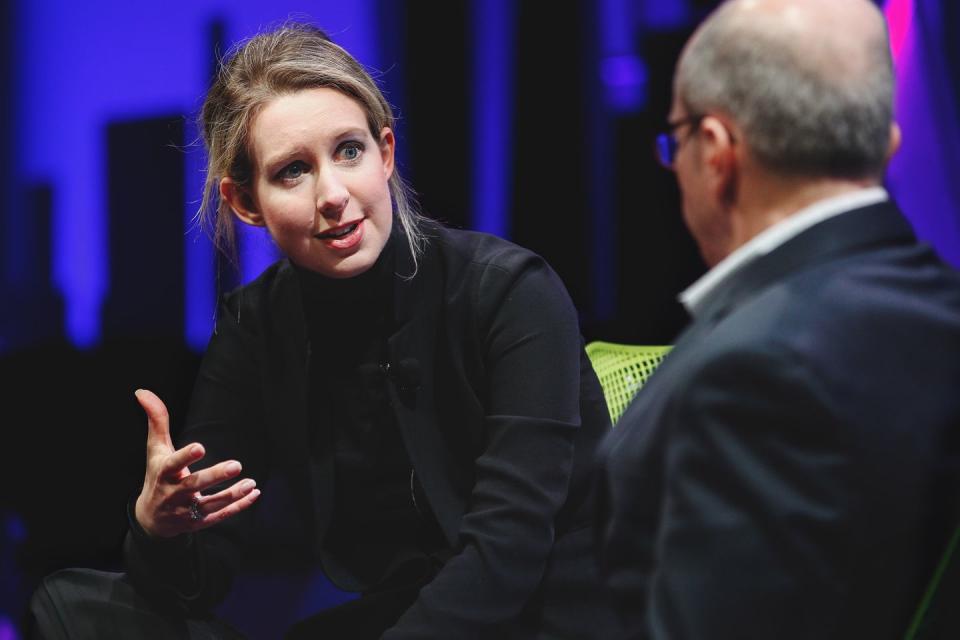How the Fall of Theranos Affects Women Leaders

Even before it all came tumbling down, Elizabeth Holmes was riveting. Har baritone voice. Those black turtlenecks. The seemingly endless plaudits she received from the tech world. That well-crafted narrative about how her fear of needles and desire to change the world led her to found a company, Theranos, that she said could perform complicated medical tests with only a finger-prick of blood.
She exhibited all the qualities that women are typically discredited for-fashion quirks, outrageous ambition, unusual vocal tics, failure to provide hard evidence-and soaked up rounds and rounds of funding anyway. Theranos’s board was stacked with the kind of old white guys whose approval has long been synonymous with power. Holmes performed a sleight of hand not often achieved by women in public life. She didn’t have to prove herself or her ideas to be handsomely rewarded for them. She was a kind of anti-Hillary: underprepared, underqualified, and beloved by men.
Now that the Securities and Exchange Commission has charged her with massive fraud for “deceiving investors by making it appear as if Theranos had successfully developed a commercially-ready portable blood analyzer,” she is no longer the world’s youngest self-made female billionaire. She’s still fascinating, but for an entirely different reason.
In March, Holmes settled with the SEC, which also alleged that she “claimed...that the company would generate more than $100 million in revenue in 2014. In truth, Theranos...generated a little more than $100,000 in revenue from operations in 2014.” Holmes agreed to pay a $500,000 fine and cede voting control of the company she created. As part of the settlement, she “neither admitted nor denied” any wrongdoing.
Is Holmes’s story a fake-it-till-you-make-it cautionary tale of what happens when you get swept up in possibilities? Or a deliberate long con? The distinction might not matter. Women are constantly second-guessed; we struggle to be taken seriously when it comes to our experiences with harassment, our pain scale at the hospital, or our attempts to get the credit we deserve for our work. So while a part of me admires Holmes’s audacity, mostly I’m angry with her for setting women back, for reinforcing the idea that we’re not to be believed.
Women like Holmes are outliers, which is perhaps why they’re the subject of such outsize attention. There is a “gender gap in ethics,” according to Laura Kray, professor of leadership at the University of California, Berkeley’s Haas School of Business. Her research shows that men are quicker than women to lie for their own personal benefit. This is partly because women are more prone to “the moral emotions of guilt and shame,” according to 2013 research by Kray and Jessica Kennedy, now an assistant professor at Vanderbilt University.
But there are more female fraudsters out there than one might think. “Female con artists are incredibly underreported,” says Maria Konnikova, author of The Confidence Game: Why We Fall for It...Every Time. “Insofar as people don’t want to admit they’ve been taken advantage of, they never want to admit to having fallen for a female con artist.” She observes that all successful swindlers exhibit some Machiavellian tendencies: a knack for convincing people to do what you want them to do while making them believe it was their own idea. “Women are very good at it,” Konnikova says. “Often they don’t have real authority, so they have to create their authority in other ways.” Picture a female tech CEO stacking her board with former secretaries of state and signaling her world-changer status with those black Steve Jobs turtlenecks.
And unsurprisingly, when professional women are caught in a lie, Kray says, they face harsher consequences than men who commit similar offenses do. “People expect it from men,” she says. “To be a woman is to be caring and selfless. So if you’re behaving unethically, then not only are you surprising us, you’re violating these cultural codes.”

Take Martha Stewart, who built her career in the feminized world of canapés and wreaths, then became the poster girl for financial bad behavior when she was sentenced to five months in prison in 2004. Stewart was convicted of lying to government officials about the reason she sold her shares in a company called ImClone to avoid a loss of around $45,000. Yet her name comes up alongside Enron’s Jeff Skilling, who sold more than $60 million in shares, and banker Dennis Levine, who netted $12.6 million, on lists of infamous insider- trading incidents. “The same traits in women are perceived very differently,” Konnikova says. “No one’s going to say a man is a blight on society. It’s like, He’s kind of brilliant. For women, it’s the opposite: ‘We always told you women were deceitful.’ The stories are cast in a very different light.”
Virtually everyone engages in some low-level dishonesty, but you rarely hear men’s transgressions used as argument-ending confirmation of negative stereotypes. In the 1970s, a Chicago woman named Linda Taylor used three Social Security cards, 27 names, 31 addresses, and 25 phone numbers to bilk the government out of welfare checks and food stamps. A Chicago Tribune investigation labeled her a “welfare queen,” a term that Ronald Reagan then picked up and used to great effect on the campaign trail in 1976. It permeated not just politics but popular culture, and became a slur used against women who were working hard and simply trying to make ends meet.
More recently, there was Jackie, the woman whose graphic story of a frat-house gang rape at the University of Virginia was published by Rolling Stone in 2014 and later completely discredited. Reporter Sabrina Rubin Erdely explained that, despite inconsistencies in her story, she found Jackie “very credible.” Indeed, social scientists analyzing crime records report that the rate of rape allegations that can be proven to be false is only 2 to 10 percent. But that doesn’t stop people from using the Rolling Stone debacle to dismiss women who come forward about an assault. “What about that girl at UVA? Didn’t she lie?” Jackie’s story ultimately had consequences for all women in similar-truthful-situations.
Which brings us back to Holmes. In Silicon Valley, women struggle to pull in a fraction of the funding she was able to secure for Theranos. Just 2 percent of venture capital dollars goes to all-female-founded start-ups. That’s partly because funders don’t believe women’s companies have the same potential. Venture capitalists, according to a study by the Harvard Business Review, “tended to ask men questions about the potential for gains and women about the potential for losses.” Male founders are asked about their highest ambitions for the company; women are asked how they’re preventing failure scenarios. Holmes, it seems, enjoyed the benefits of a line of questioning typically afforded to men.
Which is why her fraud charges are so devastating. At high-profile conferences and in dozens of glowing write-ups, Holmes was held up as a model for what happens when ambitious businesswomen gain an unprecedented level of investment and trust. To our great detriment, because of the charges against her, the world may have an answer: They fake it. And now it’ll be that much harder for the rest of us to make it.
This article originally appeared in the June 2018 issue of ELLE.
You Might Also Like

 Yahoo News
Yahoo News 
